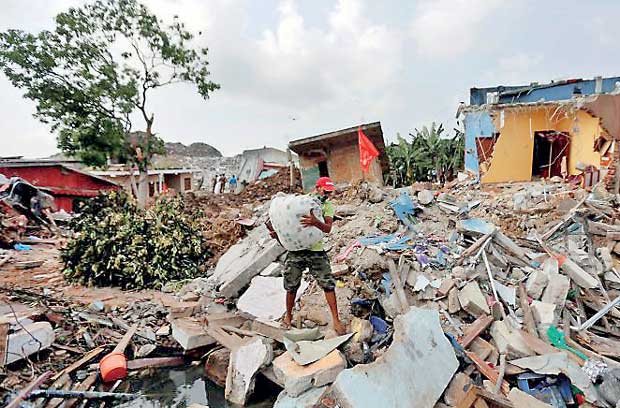Reply To:
Name - Reply Comment
Last Updated : 2024-04-18 00:44:00

 A landmark study co-authored by a Sri Lankan economist has found that income inequality at district level in Sri Lanka falls when natural disasters strike, which presents key takeaways for how policymakers should respond to disaster relief in the future.
A landmark study co-authored by a Sri Lankan economist has found that income inequality at district level in Sri Lanka falls when natural disasters strike, which presents key takeaways for how policymakers should respond to disaster relief in the future.
Destruction of wealth
Although more people at the lower income levels are affected by natural disasters, they are able to more easily diversify their income by taking part in reconstruction and recovery efforts or other low-skilled labour and many do not own significant material assets, the research showed.
“These findings may be somewhat surprising on the face of it as one would expect natural disasters to exacerbate income inequality. However, at subsistence level, people possess little that can be lost to a natural disaster,” the research paper further said.
The findings were consistent across the non-seasonal agricultural and non-agricultural income sectors. However, natural disasters were found to increase seasonal agricultural income inequality.
The study, conducted at the University of Sussex by Dr. Subhani Keerthiratne as part of her doctoral studies with her PhD advisor Professor Richard Tol, indicated that natural disasters destroy the income-generating assets of the middle-income and high-income earners, thereby disrupting their income streams for a significant time period, although many at this level have insured their assets.
Each one percent of a district population affected by natural disasters results in an effect similar to a 0.5 percent income tax on the richest 20 percent of population, which is distributed to the poorest 20 percent of the population, the results of the study indicated.
Dr. Keerthiratne, who is currently a Senior Assistant Director at the Financial Intelligence Unit of the Central Bank, said that although to her knowledge, this is the first such research conducted on Sri Lanka, the findings corroborate with the studies conducted in other regional economies.
Interestingly, the study, which had analysed data from six Household Income and Expenditure Surveys of the Census and Statistics Department from 1990 till 2013, found that expenditure inequality did not change even if natural disasters strike.
Speaking to Mirror Business, Dr. Keerthiratne said that this was either consistent with the mainstream economic theory—the Permanent Income Hypothesis—on how households spend based on their long-term average income or that households across all income levels reduced their expenditure proportionately in response to disasters.
Links to national inequality
The findings of the study were consistent across multiple income inequality measures and even when not taking into account the regions and periods when the sample could have been drastically affected by the effects of the 2004 Boxing Day tsunami or civil war.
Although the research was conducted at district level, it could have some relevance at national level as well, according to Dr. Keerthiratne.
National inequality in Sri Lanka improved as the country’s Gini score fell to 0.45 in 2016 compared to a score of 0.48 in 2012/13. In mid-2016, floods severely affected the production capacity in the Western Province, which has the highest population density in the country and accounts for 40 percent of the country’s gross domestic product.
Dr. Keerthiratne said that while the floods which affected the Western Province could have had an effect on the national inequality decreasing in 2016, it could not be considered as the only cause since various other factors are at play. Interestingly, disasters in general, even at regional or global level, have lead to a narrowing of inequality. In Europe, the works of Guido Alfani and Thomas Piketty show how inequality has consistently grown since the 13th century until modern day, except during the Black Death in the 14th century and the World Wars in the 20th century.
Policy implications
Meanwhile, Dr. Keerthiratne said that reduction of inequality by the destruction of income streams of the wealthy is not helpful for a developing economy.
“While the policymakers should ensure that there is disaster resilience in the country and that the low-income groups should be taken care of due to their inherent economic vulnerability, those at the middle and high-income groups, especially the small business owners, shouldn’t be ignored,” she said.
This is especially relevant at present, since Sri Lanka has been on the receiving end of multiple natural disasters over the past two years, with 1.5 million people affected by natural disasters in 2015 and a further one million affected in 2016.
The country’s growth has dipped significantly during this period, with high inflation being generated due to supply-side disruptions arising from these disasters.
“We need further research into the economic implications of disasters in Sri Lanka,” Dr. Keerthiratne said.
The government has responded to the recent downturn by introducing a host of disaster recovery and resilience proposals in the 2018 budget and the World Bank recently commended this, although saying that more budgetary allocation would have been better.
In order to sustainably decrease inequality in the economy, the policymakers should uplift the low-income earners, Dr. Keerthiratne said.

Add comment
Comments will be edited (grammar, spelling and slang) and authorized at the discretion of Daily Mirror online. The website also has the right not to publish selected comments.
Reply To:
Name - Reply Comment
On March 26, a couple arriving from Thailand was arrested with 88 live animal
According to villagers from Naula-Moragolla out of 105 families 80 can afford
Is the situation in Sri Lanka so grim that locals harbour hope that they coul
A recent post on social media revealed that three purple-faced langurs near t